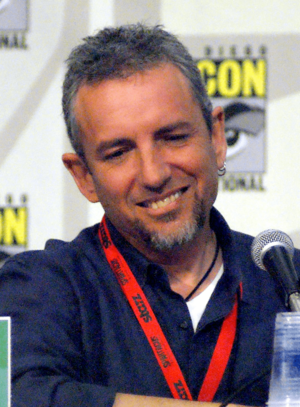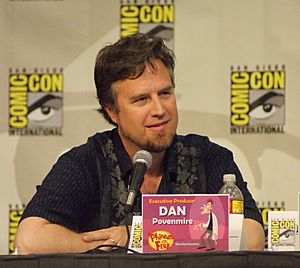Jeff "Swampy" Marsh facts for kids
Quick facts for kids
Jeff "Swampy" Marsh
|
|
|---|---|

Marsh at the 2009 San Diego Comic-Con
|
|
| Born | Jeffrey Kent Dudman December 9, 1960 Santa Monica, California, U.S. |
| Occupation |
|
| Years active | 1989–present |
| Notable works |
|
| Spouse |
Birgitte Bear Verburgt
(m. 2006) |
| Children | 2 |
| Relatives | Les Brown (grandfather) |
Jeffrey Kent "Swampy" Marsh, born on December 9, 1960, is an American animator, voice actor, writer, director, and producer. He is best known as the co-creator and co-star of the popular animated series Phineas and Ferb and Milo Murphy's Law, which he created with Dan Povenmire. Marsh has also worked on many other famous animated shows, including The Simpsons, King of the Hill, and Rocko's Modern Life.
Marsh grew up in Santa Monica, California, in a large blended family. He spent several years living and working in England before returning to the United States to develop Phineas and Ferb. His work on the series has earned him nominations for Emmy Awards for songwriting.
Contents
Early Life and Interests
Jeffrey Kent Dudman was born on December 9, 1960. He grew up in Santa Monica, California. His family was a large blended family, and his stepfather, Bill Marsh, later adopted him. This is how his last name became Marsh.
During his summer breaks, Marsh loved to be active outdoors. He would dig trenches and tunnels, build tree houses, and construct forts. He also enjoyed watching cartoons, and his favorite cartoon heroes were from Hanna-Barbera and King Features Syndicate. Music was a big part of his family life, too. His grandfather was the famous bandleader Les Brown. Marsh learned to play several instruments, including the banjo, trombone, trumpet, and guitar. He remembers pretending to be in rock bands with his friends and family.
In high school and college, Marsh took classes in architectural drawing. He also participated in theater productions. These experiences helped him understand how sets are built for shows.
Career Beginnings
Marsh once worked as a vice president of sales and marketing for a computer company. One day, he decided to quit and pursue his passion for animation. A friend helped him create a portfolio to start his new career.
Working on The Simpsons

In 1990, Marsh began working on the animated TV series The Simpsons. He was a background layout artist. He worked on the show for over six seasons. Three episodes he helped produce even won Emmy Awards. Marsh kept many books about art and architecture to help him with his animation work. His desk at The Simpsons office was across from another layout artist, Dan Povenmire. They quickly became friends because they shared a similar sense of humor and taste in music.
Collaborating on Rocko's Modern Life
By 1993, Marsh was working as a writer and director on Nickelodeon's animated series Rocko's Modern Life. This was Nickelodeon's first cartoon made "in house." He worked with Dan Povenmire again, this time as a writing partner. Marsh joked that the crew paired them because Povenmire was neat and he was messy. They developed a unique style, often including musical numbers and chase scenes in their stories. They even won an Environmental Achievement Award for a Rocko episode they wrote in 1996.
In 1996, Povenmire and Marsh came up with the idea for Phineas and Ferb. The idea came from their own childhood summers spent playing outdoors. Povenmire tried many times to get the series made, but it was not picked up right away. In 1997, Marsh became one of the first artists for the Fox Network animated series King of the Hill. He worked as both a storyboard artist and a designer for that show.
Time in England
After working on Rocko's Modern Life in 1996, Marsh moved to London, England. He lived there for six years and found it "absolutely fantastic." While in London, he worked on several animated TV shows. These included Legend of the Dragon, Postman Pat, and Bounty Hamster. He also worked on projects for major companies like BBC, ITV, and Carlton TV. Marsh was also a big part of producing several British feature films for BKN International.
Around 2005, Dan Povenmire contacted Marsh. He told him that Phineas and Ferb had finally gotten some interest from The Walt Disney Company. Disney wanted to see an eleven-minute pilot. Marsh immediately agreed and started getting ready to move. He had a vacation planned to Los Angeles, and Povenmire was going to France. Povenmire changed his plans to visit England, and Marsh flew to Los Angeles for two days. There, he created the story outline for the episode "Rollercoaster". Povenmire then drew the storyboards in France. After that, they met in England to refine the dialogue and make sure everything was perfect.
Phineas and Ferb and Beyond
Creating Phineas and Ferb
Marsh moved back to the United States after Disney accepted the pilot episode. They ordered a full 26-episode season of Phineas and Ferb. To convince Disney executives overseas, Marsh and Povenmire recorded the storyboards for "Rollercoaster" instead of using a regular script. Povenmire voiced all the characters, added sound effects, and narrated the story. When the recording was sent, the executives approved, and the series was officially given the green light for Disney Channel. Phineas and Ferb first aired on February 1, 2008.
Marsh and Povenmire wanted to include the same kind of humor they used in Rocko's Modern Life. They added action scenes and, with Disney's encouragement, included musical numbers in almost every episode. Povenmire called the songs their "jab at immortality." They have earned two Emmy nominations for Phineas and Ferb songs. The show's artistic style was influenced by Tex Avery. It uses geometric shapes for characters and backgrounds. Marsh also voices the character of Major Francis Monogram in the show. He based the character's voice on the famous journalist Walter Cronkite.
New Projects and Revivals
The original run of Phineas and Ferb ended on June 12, 2015. After that, Marsh and Povenmire wrote and performed the opening song for the Yo-kai Watch series outside of Japan. They then worked together again to create a new series for Disney XD called Milo Murphy's Law. This show premiered on October 3, 2016, and ran for two seasons. Marsh also developed an animated TV series for Amazon Prime based on the Pete the Cat children's book series. This show premiered in December 2017 and ran until March 2022.
In 2020, Marsh's recent work included Phineas and Ferb the Movie: Candace Against the Universe, which was released on Disney+ on August 28, 2020. In 2019, Marsh was announced as a producer, director, and voice director for a web series called S.A.L.E.M.: The Secret Archive of Legends, Enchantments, and Monsters. He is also an executive producer on the upcoming Disney Junior animated series Hey AJ. On March 16, 2023, it was announced that Marsh would return as an executive producer and voice director for a new Phineas and Ferb revival, which premiered on June 5, 2025.
Personal Life
Jeff "Swampy" Marsh is married to Birgitte Bear Verburgt. He has two children and four grandchildren. He got the nickname "Swampy" while attending college in England. It was a playful reference to his last name, "Marsh". He later added it to his credited name: Jeff "Swampy" Marsh. He once said he likes having "Swampy" in his name because it makes it longer than most other people's names.
See also
 In Spanish: Jeff Marsh para niños
In Spanish: Jeff Marsh para niños
 | Claudette Colvin |
 | Myrlie Evers-Williams |
 | Alberta Odell Jones |

